How To Catch Redfish on the Fly With No Visibility: The 3 Fundamentals
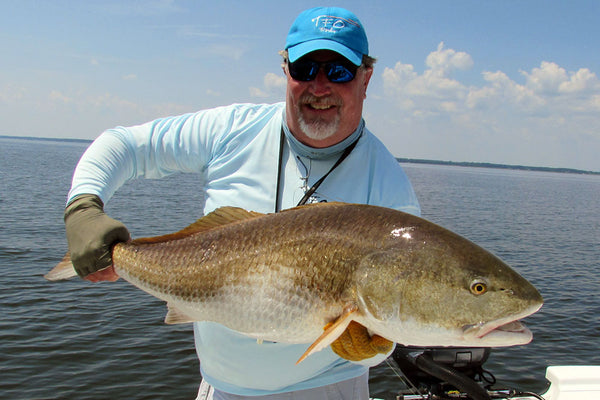
Sight fishing for redfish on the fly is a huge thrill!
But what about those days when the water is stained, the clouds are out, the wind is up, or the fish are in deeper water?
You’ve been planning this trip for months; there’s no way you’re packing it in and going home because the conditions didn’t happen to align perfectly with your plans.
Since 1999, it’s been my job to help anglers catch giant redfish in low visibility conditions. The waters I guide in on the Neuse River and the Pamlico Sound in North Carolina are tannic and the bottom dark, so sight-casting for redfish is difficult here.
The same principles I’ve developed over the years here are applicable to similar situations anywhere.
Here’s how to catch redfish on those days with less than ideal visibility.
1. Narrow your search.
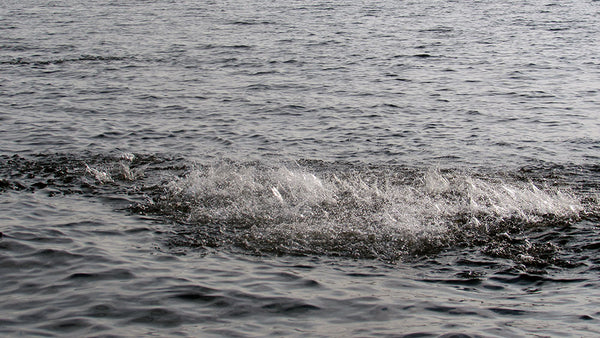
Narrow the search for giant redfish by looking for signs; big schools of nervous bait, slicks, fish busting, fishing structure, and birds.
Bait.
Look for bait. Lots of bait means lots of fish.
Menhaden and mullet are always good choices. Yes, crabs and shrimp are redfish favorites, but baitfish have more protein and provide more calories for less work.
Remember, the more nervous the bait the better!
Slicks.
When redfish eat, they crush their food, and crushed baitfish means slicks – shiny patches on the surface with a fishy, sweet smell.
The rounder the slick the fresher it is, and the bigger the slick the more fish there are.
Remember to concentrate your efforts uptide or upwind of a slick.
Fishing structure.
Look for edges, breaks, points, sloughs and bars.
Redfish like to move along a change near the bottom that moves into deep water. An area like a slough, which is narrow and has two edges in close proximity, can condense the fish and increase your chance of intersecting them.
2. Slow it down.
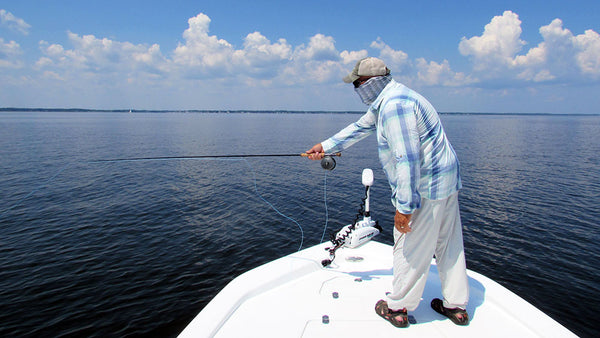
You’ve narrowed your search and are now in an area with signs of redfish.
Sure, if you started blind-casting you’d have a better chance of catching one than if you hadn’t bothered to get yourself to a place where redfish are present, but it’s still inefficient and usually won’t be successful.
The key is to take advantage of their aggressive, competitive nature.
Redfish have a unique feeding sound. When they hear other redfish feeding, they come to investigate and join in the meal.
An interesting thing about adult red drum is they’ll be drawn in by the sound of a popper, but they generally won’t take it off the surface.
It took me some time to work out a way around this, but after some experimentation I developed the Pop-N-Fly, a foam cylinder with an embedded Articulated Shank attached between the leader and tippet with a lightweight streamer attached to the tippet about 24 inches off the cylinder.
When stripped, it makes noise like a redfish feeding; hard pops and bangs on the surface. Strip once or twice, then pause to allow the fly to drop the full length of the tippet, looking like a wounded baitfish. All your bites will occur on that pause. In colder temps, increase your pause time.
Even though you don’t see the fish or have an idea how far away one might be, this allows you to call the fish from any depth and from a distance away from the fly.
Imagine it as three-dimensional fishing. You’re fishing in 8 feet of water. The fish is 6 feet down and 25 feet to the right of your fly, but it comes to the noise, sees your fly, and sucks it in! You’ll never get that kind of coverage blind-casting a fly.
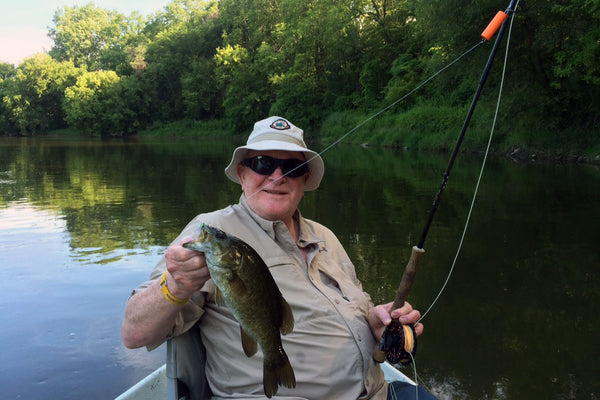
This technique works for a wide variety of freshwater and saltwater species. Photo by Mike Schultz of Schultz Outfitters.
Remember, there’s no rush to fishing the Pop-N-Fly. Keep in mind you’re not fishing a popper. Don’t fish the rig too fast, and be patient; you’re fishing for a fish of a lifetime.
3. Hook the fish properly.
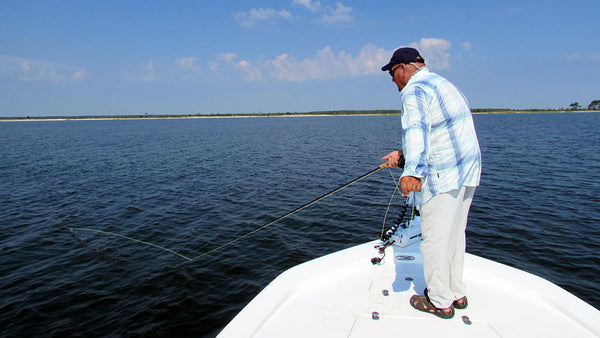
Don’t lift the rod, and don’t strip strike; just strip!
Raising the rod tip while setting the hook will only put slack in your line. You need to pull a resistant foam cylinder through the water and straighten the leader from the cylinder to the fly before the hook is set.
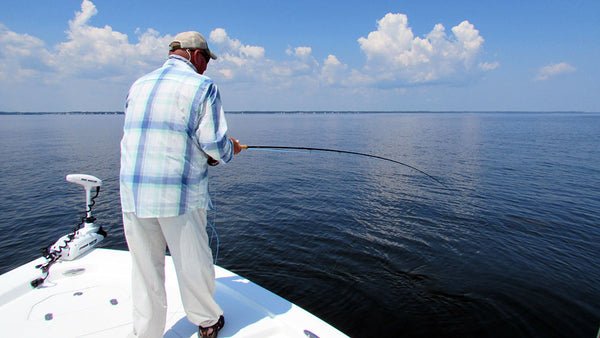
To do this, get the line tight with your rod tip to the water. Instead of doing a short strip strike, strip the fly line until the fly comes tight in the fish’s mouth.
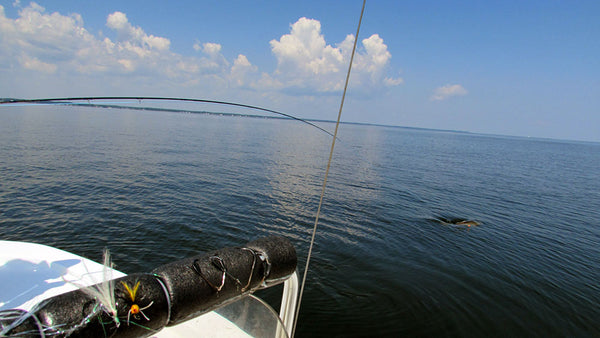
When the fish feels pressure it’ll go and go fast! Pull tightly as the fish surges away to bury the hook.
Remember, a tight line works much better than a raised rod ever does.
Quick review.
Narrow down your search by looking for the telltale signs, fish the rig patiently with pauses, and be sure to simply strip in order to hook the fish properly!
Want more articles like this?
Subscribe to the Flymen Newsletter at the bottom of the page!
About Captain Gary Dubiel:
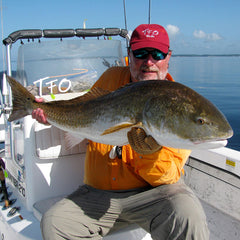 Gary has been guiding for over 15 years. He owns and operates Spec Fever Guide Service on the coast of North Carolina, has written and lectured on both fly fishing and light tackle, and he has appeared on a number of angling shows on ESPN 2, WFN, UNC-TV, NBC Sports, the Sportsman Channel and Discovery Channel (Europe). He's a frequent speaker at local and national fishing shows including the Saltwater Sportsman's National Seminar Series, the Fly Fishing Show, and the Virginia Fly Fishing Festival.
Gary has been guiding for over 15 years. He owns and operates Spec Fever Guide Service on the coast of North Carolina, has written and lectured on both fly fishing and light tackle, and he has appeared on a number of angling shows on ESPN 2, WFN, UNC-TV, NBC Sports, the Sportsman Channel and Discovery Channel (Europe). He's a frequent speaker at local and national fishing shows including the Saltwater Sportsman's National Seminar Series, the Fly Fishing Show, and the Virginia Fly Fishing Festival.



Capt. Dubiel,
The big redfish season on the Neuse is coming soon. What leader set up on your fly rod do you use? I’ll be throwing one of your poppers on an 8 weight line. Are you throwing a straight leader or do you taper down for best casting?
Tight lines,
Ray Howell
What size leader are you using from the fly line to the pop-n-fly?
Subscribe to fly man Newsletter
Hey, thanks for the great article. We’re going to the TX coast in a couple of weeks and I plan to use your advice and the poppers! Thanks!
Just returned from my first fly fishing trip for reds in the Charleston, SC area. I wish I had read this article…I wish my guide had read this article! Thank you so much!
Leave a comment